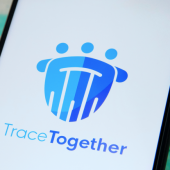Our website uses cookies so we can analyse our site usage and give you the best experience. Click "Accept" if you’re happy with this, or click "More" for information about cookies on our site, how to opt out, and how to disable cookies altogether.
We respect your Do Not Track preference.

| The information on this page is more than one year old and no longer current. Please visit our Privacy and COVID-19 page for the most up-to-date information. |
As countries around the world produce contact tracing apps as part of their efforts to manage the spread of the Covid-19 virus, New Zealand will soon launch its own version.
By now, we’ve all learned that contact tracing is part of a trinity of public health measures which can be used to slow or eliminate the spread of a pandemic. The other two key elements are social distancing and testing.
Contact tracing involves working backwards from an infected case to identify people who may have been exposed to the disease, so they can be tested, isolated and treated.
Contact tracing work is usually manual. It’s specialised, labour-intensive work requiring in-depth interviews with each person who may have been in contact with an infected person. The infected person may have been a friend or colleague, or a stranger who crossed paths with another person at one location at the same time. Or they may have contaminated a surface or object, later touched by others.
While businesses are developing ways of registering people who come on their premises (we’ll be issuing more guidance on this separate topic soon), governments are increasingly looking to give citizens digital tools to help with contact tracing.
Racing against the virus
Imagine if there was a faster way of contact tracing – one that required much less manual effort. In this race against the virus’ reproductive rate, many countries have been turned on to the potential of apps as contact tracing tools. We’ve seen from current overseas examples that apps work best to augment manual tracing. No one country has yet created an app that can completely replace manual methods.
As well as coming up against the limits of technological innovation, the other critical issue is privacy and trust. Citizens want to know the information being collected about them is secure and only used for the purpose of helping with the public health effort. If they don’t have confidence in an app, they won’t download it and use it.
One promising strategy is exposure notification through a contact tracing app. This is when the technology which uses Bluetooth connectivity will notify you if you have had contact with an infected person and advise you to get tested and self-isolate. It is very privacy enhancing. You can find out more about that here.
Comparing apps around the world
With increasing public interest in this issue, we’ve created a summary of contact tracing apps around the world. Nearly all these apps are voluntary to download and activate. If citizens have confidence in their governments’ efforts to contain the virus, they will be encouraged to want to play their part. Otherwise uptake will be low, and little will be achieved in terms of tracing, despite the investment in creating and promoting the app.
Here's an example from Turkey:

The New Zealand Privacy Commissioner John Edwards has been underlining these key messages in recent media interviews. Here’s one he did with RNZ’s Nine to Noon programme and another with Magic Talk Radio. You can also read his article in The Spinoff.
At the time of writing, there are over 50 contact tracing apps reportedly being used in 28 countries. Of the apps surveyed by the tech website top10vpn.com, 25 percent had no privacy policy. That means a quarter of the apps did not inform users what information was being collected, how long it would be kept and how it would be used. In New Zealand, that would be in breach of our Privacy Act.
There won’t be a perfect app. There will be many different technology contributions to improving the pace and efficacy of contact tracing. As in so many areas of this crisis, we’re breaking new ground. One thing that seems sure is that whatever functionality is developed, its success will to a large degree depend on maintaining public trust.
Image credit: Singapore's TraceTogether app via TechWireAsia
Back